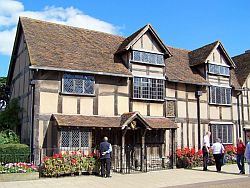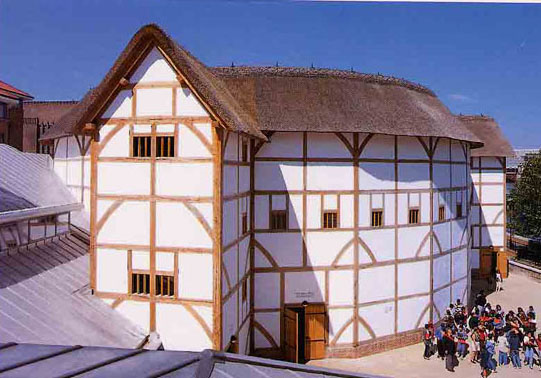|
Shakespeare Day in United
Kingdom
Many fans and enthusiasts
of William Shakespeare, who was one of England’s greatest poets and dramatists,
celebrate National Shakespeare Day, also known as Shakespeare Day, on April 23
each year. April 23 is also St George’s Day and the United Nations’ World Book and Copyright Day, which was a natural choice to pay
a worldwide tribute to writers such as Shakespeare.
William Shakespeare's works are celebrated on Shakespeare Day.
What do people do?
 Special pageants are held
at Stratford-upon-Avon in Warwickshire, where Shakespeare was born and where
thousands of tourists go each year to see his plays performed. The bells of Holy
Trinity Church ring out and the Mayor of Stratford leads a procession there to
lay flowers on Shakespeare’s’ grave. The procession includes bands, civic
dignitaries, costumed actors and actresses, Morris dancers, and the staff and
pupils of some local schools. Special pageants are held
at Stratford-upon-Avon in Warwickshire, where Shakespeare was born and where
thousands of tourists go each year to see his plays performed. The bells of Holy
Trinity Church ring out and the Mayor of Stratford leads a procession there to
lay flowers on Shakespeare’s’ grave. The procession includes bands, civic
dignitaries, costumed actors and actresses, Morris dancers, and the staff and
pupils of some local schools.
In some schools, regular
lessons are set aside for students to learn about the great playwright and
poet, and his sonnets, narrative poems and plays. Enthusiasts and fans,
including the British Shakespeare Company, have campaigned for Parliament in
the United Kingdom to officially recognize national Shakespeare Day.
Public life
Shakespeare’s Birthday is
an observance and not a bank holiday in the United Kingdom.
Background
No one really knows the
exact date of William Shakespeare’s birth, although he was baptized on April
26, 1564, and died on April 23, 1616. Some believe he was born on April 23,
although birth dates were generally not recorded in his time. In his younger
years Shakespeare attended the Christian Holy Trinity church, the now famous
limestone cross-shaped cathedral on the banks of the Avon River in the United
Kingdom.
At the age of 18
Shakespeare married Anne Hathaway, who bore him three children. Between 1585
and 1592 he began a successful career in London as an actor, writer, and
part-owner of the playing company the Lord Chamberlain's Men, later known as
the King's Men. It is believed that he retired in Stratford around 1613, where
he died three years later. Few records of Shakespeare's private life survive,
and there has been considerable speculation about such matters, and whether the
works attributed to him were written by others.
This Bard of Avon has been
referred to as a "literary genius” and "Britain’s greatest playwright and
poet”. His work includes comedies, such as The Taming of the Shrew and
a Midsummer Night’s Dream, as well as tragedies such as King Lear,
Hamlet and Romeo and Juliet. Much of his work has been seen
in modern-day theatre, the ballet and in modern films. His plays have been
translated in many different languages across the world.
Shakespeare’s increasing
popularity in modern times is reflected by National Shakespeare Day, which
started as an idea from Robert J Williamson, the Artistic Director of the British Shakespeare Company. National Shakespeare Day is
supported by many people in the United Kingdom, including government ministers.
Symbols
The Globe Theatre was a
theatre in London associated with William Shakespeare. It was built in 1599 but
was later destroyed by fire. A second Globe Theatre was rebuilt on the same
site in 1614 and closed in 1642. A modern reconstruction of the theatre,
"Shakespeare’s Globe”, is currently located in London. It consists of: The
Globe Theatre, with a professional theatre company incorporating international
artists playing a summer season of plays; Globe Education, which works with
students of all ages; and Shakespeare’s Globe Exhibition, devoted to
Shakespeare and his contemporaries in performance.
Other symbols identified
with Shakespeare include: an image of the poet on a postage stamp or on a
portrait; and symbols from his plays, such as a rose (Romeo and Juliet),
a human skull (Hamlet), and blood, ghosts and witches (Macbeth).

|